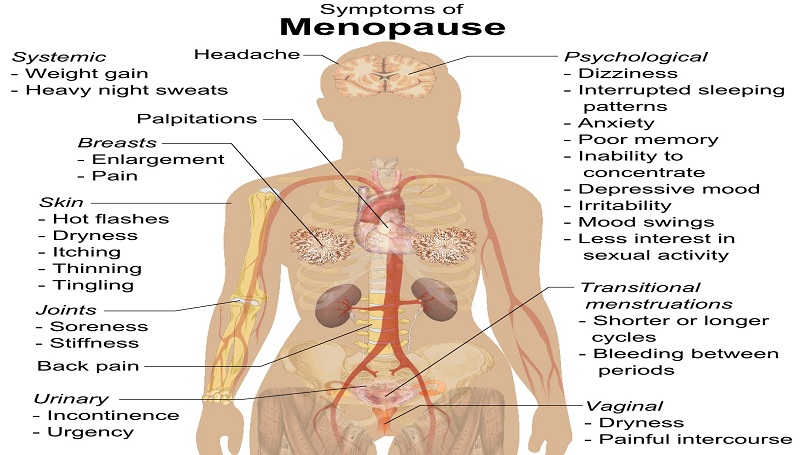Menopause and Heart Disease: What Are Risk Factors?
 Heart disease is the leading cause of death in women over age 50. Studies show that a woman’s risk of developing heart disease rises significantly after menopause. So what is the connection between menopause and the risk for heart disease? Can heart disease after menopause be prevented? To get a better idea about these questions, it is important to learn what the most current research has to say about heart disease and menopause.
Heart disease is the leading cause of death in women over age 50. Studies show that a woman’s risk of developing heart disease rises significantly after menopause. So what is the connection between menopause and the risk for heart disease? Can heart disease after menopause be prevented? To get a better idea about these questions, it is important to learn what the most current research has to say about heart disease and menopause.
The Link Between Heart Disease And Menopause
As women enter the beginning stages of menopause, estrogen levels decrease rapidly in the body. Estrogen is believed to help protect the heart and keep it healthy. Studies have found a correlation between low estrogen and the development of cardiovascular disease. Women who undergo early menopause, or who have their ovaries removed surgically at an early age are at an increased risk of heart disease. The earlier that estrogen decreases in life, the higher the risk. Research has concluded that women who experience early menopause and receive hormone replacement therapy are not at as high risk as those who do not.
Menopause Related Risk Factors
In addition to early menopause, estrogen decline also leads to High LDL (bad cholesterol) and low HDL (good cholesterol). This further increases risks for developing cardiovascular disease. Women with natural menopause which occurs after the age of 40 become at risk after their estrogen levels begin to fall.
Other Risk Factors
Weight gain and obesity, smoking, high blood pressure, lack of exercise and a family history of cardiovascular disease are all additional risk factors for heart disease that are increased after menopause.
How Women Can Reduce Their Risk Of Heart Disease During Menopause?
Lifestyle changes are the top physician recommended ways that women can reduce their risks. Eating a healthy and balanced diet and maintaining a healthy body weight is at the top of the list. By supplying your body with the nutrition it needs you help to keep your immune system stronger. Get plenty of lean proteins, fruits, vegetables, fish, and include soy in your diet to help offset any hormonal imbalances.
Regular exercise contributes to weight management and helps to build heart muscle. In addition, physical activities that are enjoyable such as dancing, swimming, bicycling and jogging with a friend is a pleasurable way to get good healthy exercise that may also help to alleviate stress and anxiety.
Women who currently smoke should quit immediately as this activity doubles the risk of heart disease. In addition, cutting back on the amount of alcohol consumed is recommended.
Anyone who is at risk for developing heart disease should schedule regular annual visits with their health care providers for a routing screening to check blood pressure and cholesterol levels.
Does Hormone Replacement Therapy (HRT) Help To Reduce Risks For Heart Disease?
It was previously believed that hormone replacement therapy (HRT) was helpful in reducing the risk of heart disease, however; current studies have shown contradictory results. Although there is still evidence to suggest that hormone replacement is beneficial in reducing the incidences of diabetes and osteoporosis in menopausal women, the use of HRT is no longer recommended for prevention of serious disease as the risk factors outweigh the potential benefits.
Conclusion
Risk factors for heart disease in women increase during menopause. It is believed that there is a connection between lower estrogen levels and these risks. While hormone therapy to replace estrogen was initially believed to help lower these risks, current research suggests that this may not be the case. Other risk factors that increase a woman’s likelihood of developing heart problems include weight gain and obesity, living a sedentary lifestyle with a lack of exercise and physical activity, smoking, having diabetes and a family health history that suggests a genetic predispositions.
Experts now recommend that in order to reduce the risks for heart disease after menopause, women must begin making lifestyle changes as early as possible. Eating a healthy diet that is low in fats, sugars and salts, combined with the recommended amounts of vigorous exercise may help reduce some of the risk factors. Avoiding tobacco products including smoking and second hand smoke and limiting alcohol consumption are also helpful in cutting risk factors. Finally, regular physical exams to monitor blood pressure and cholesterol levels can help to detect problems early on.




